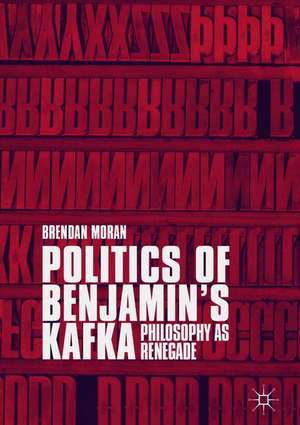Politics of Benjamin’s Kafka: Philosophy as Renegade
Autor Brendan Moranen Limba Engleză Hardback – 14 iun 2018
| Toate formatele și edițiile | Preț | Express |
|---|---|---|
| Paperback (1) | 528.48 lei 43-57 zile | |
| Springer International Publishing – 4 ian 2019 | 528.48 lei 43-57 zile | |
| Hardback (1) | 703.20 lei 43-57 zile | |
| Springer International Publishing – 14 iun 2018 | 703.20 lei 43-57 zile |
Preț: 703.20 lei
Preț vechi: 827.28 lei
-15% Nou
Puncte Express: 1055
Preț estimativ în valută:
134.59€ • 138.70$ • 113.63£
134.59€ • 138.70$ • 113.63£
Carte tipărită la comandă
Livrare economică 03-17 martie
Preluare comenzi: 021 569.72.76
Specificații
ISBN-13: 9783319720104
ISBN-10: 3319720104
Pagini: 368
Ilustrații: XIX, 350 p.
Dimensiuni: 148 x 210 mm
Greutate: 0.59 kg
Ediția:1st ed. 2018
Editura: Springer International Publishing
Colecția Palgrave Macmillan
Locul publicării:Cham, Switzerland
ISBN-10: 3319720104
Pagini: 368
Ilustrații: XIX, 350 p.
Dimensiuni: 148 x 210 mm
Greutate: 0.59 kg
Ediția:1st ed. 2018
Editura: Springer International Publishing
Colecția Palgrave Macmillan
Locul publicării:Cham, Switzerland
Cuprins
Introduction.- PART I. INHUMANLY WISE SHAME.- 1. Gesture of Philosophy.- 2. Historico-Philosophic Shame.- 3. Unmythic Wisdom.- 4. Foolishness of Philosophy.- 5. Prophecy of Shame.- Part II. ANXIETY AND ATTENTIVENESS.- 6. Anxiety.- 7. Study.- 8. Distractedly Attentive.- 9. Anxious Friendliness as Physical Attentiveness.- PART III POLITICS.- 10. Exception and Decision.- 11. In the Epic ‘Vorwelt’.- 12. Philosophy, Literature, Politics.- Bibliography.-Acknowledgements.- Index.
Notă biografică
Brendan Moran is Associate Professor of Philosophy, University of Calgary, Canada. His publications include a book on Benjamin’s early writings, and articles on Benjamin, Agamben, Laruelle, Heidegger, Levinas, and Salomo Friedlaender. He has also co-edited two books with Carlo Salzani, Philosophy and Kafka, and Towards the Critique of Violence: Walter Benjamin and Giorgio Agamben.
Textul de pe ultima copertă
This book provides a critical assessment of Benjamin’s writings on Franz Kafka and of Benjamin’s related writings. Eliciting from Benjamin’s writings a conception of philosophy that is political in its dissociation from – its becoming renegade in relation to, its philosophic shame about – established laws, norms, and forms, the book compares Benjamin’s writings with relevant works by Agamben, Heidegger, Levinas, and others. In relating Benjamin’s writings on Kafka to Benjamin’s writings on politics, the study delineates a philosophic impetus in literature and argues that this impetus has potential political consequences. Finally, the book is critical of Benjamin’s messianism insofar as it is oriented by the anticipated elimination of exceptions and distractions. Exceptions and distractions are, the book argues, precisely what literature, like other arts, brings to the fore. Hence the philosophic, and the political, importance of literature.
Caracteristici
Reflects on Benjamin’s specifically “philosophical” politics through the lens of his work on Kafka - the first study to do this Criticizes aspects of Benjamin's messianism that envision redemption as the complete overcoming of distortion Shows that, for Benjamin’s Kafkan outlook, the philosophic task includes recalling all are part of the “world theatre”
